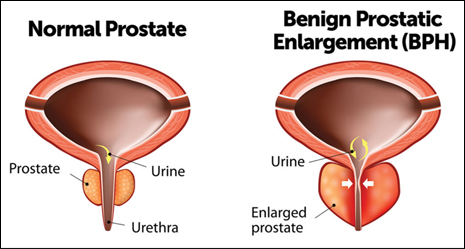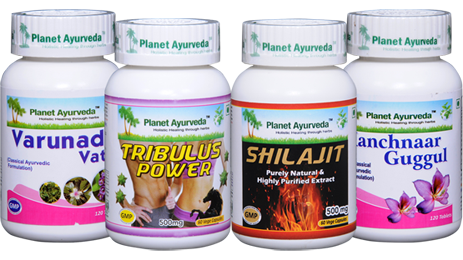Ayurvedic Treatment of Benign Prostatic Hyperplasia (BPH)

About Benign Prostatic Hyperplasia (BPH)
Benign prostatic hyperplasia (BPH) also known as benign prostatic hypertrophy is an enlarged prostate that can block the urethra (a tube that excretes urine out of the body.) It is very common problem after 40 years of age in men. The prostate is a small gland found only in men, located below the bladder.
Causes of Benign Prostatic Hyperplasia (BPH)
- Changes in hormone balance and in cell growth.
- Sedentary or insufficient physical work
- Suppression of urge for urinating
- Incompatible food intake
- Lifestyle disturbance
Certain medications also trigger the symptoms:-
- Cold or sinus medications that contain decongestants or anti-histamines
- Asthma drugs (esp. inhalers)
- Allergy and hay fever drugs
Symptoms of Benign Prostatic Hyperplasia (BPH)
Nerves within the prostate and bladder may also play a role in causing the following common symptoms:
- Urinary frequency - The need to urinate frequently during the day or night (nocturia), usually voiding only small amounts of urine with each episode
- Urinary urgency - The sudden, urgent need to urinate, owing to the sensation of imminent loss of urine without control
- Hesitancy - Difficulty initiating the urinary stream; interrupted, weak stream
- Incomplete bladder emptying - The feeling of persistent residual urine, regardless of the frequency of urination
- Straining - The need strain or push to initiate and maintain urination in order to
- fully evacuate the bladder
- Disturbed sleep at night
- Decreased force of stream - The subjective loss of force of the urinary stream over time
- Dribbling - Due to a poor urinary stream
Complications of Benign Prostatic Hyperplasia (BPH)
- In a small number of cases, BPH may cause the bladder to be blocked, making it extremely hard to urinate.
- Backed-up urine in the bladder (urinary retention), leading to bladder infections or stones, or kidney damage.
Diagnosis of Benign Prostatic Hyperplasia (BPH)
- Physical examination.
- Urine test (urinalysis)
- Digital rectal examination (DRE) to feel the size of prostate.
- Prostate specific antigen (PSA) test to rule out prostate cancer.
- Cystoscopy
Ayurvedic Approach
Ashthila along with two other conditions known as mootrakrucha and mootraaghaata caused due to aggravation of Vata especially the Apana Vayu described in ayurvedic texts coincides with the symptoms of Prostate enlargement. Mootrakruchra or difficulty in urinating is characterized by severe pain in passing urine whereas in mootraaghaata, there is total suppression or intermittent flow of urine during urination.
Herbal Remedies for Benign Prostatic Hyperplasia (BPH)
Planet Ayurveda provides best combination of effective herbal remedies such as Prostate Care Pack for ayurvedic treatment of enlarged prostate (BPH). These herbal remedies are prepared from using best quality herbs and strictly follow the principles of Ayurveda. All these herbal remedies of Planet Ayurveda are 100 percent pure, natural and vegetarian. These are free from chemicals, additives and preservatives. These are safe to use as these are free from side effects.
Dosage
- Varunadi Vati - 2 tablets twice daily, with warm water, after meals.
- Tribulus Power - 2 capsules twice daily, with warm water after meals.
- Shilajit Capsules - 2 capsules twice daily, with warm water, after meals.
- Kanchnaar Guggul - 2 tablets twice daily, with warm water, after meals.
Products Description
1. Varunadi Vati
Crataeva nurvala is the tree known as Varuna in Ayurveda. The herbal tablets made from the bark of this tree are recommended in Ayurveda for prostate enlargement or BPH. Ayurveda is an age old traditional medical system still in practice in India and recognized by WHO. totally herbal non-hormonal ayurvedic medicine that treats BPH by reducing prostate weight. It improves the urinary flow rate as reducing post-void residual urine.
2. Tribulus Power
Tribulus is a herb very popular for its use as a male sex power enhancement herb. The herb Tribulus helps to maintain regular urine flow, stops dribbling after urination, helps to control urgency of urine as well as gives strength to genitor-urinary system. Tribulus power capsules are used along with other herbal supplements as effective herbal remedy for enlarged prostate gland.
3. Shilajit Capsules
Shilajit is very popular in Indian subcontinent and Himalayan region because of its anti-ageing properties and numerous health benefits. Traditionally it is used in all type of male health conditions related to genito-urinary system. Shilajit is used for burning sensation during micturation, incontinence of urine resulted from enlarged prostate or stone in the bladder or kidney. Shilajit is an excellent natural remedy for Benign Prostatic Hypertrophy.
4. Kanchnaar Guggul
This is another effective herbal remedy for Enlarged prostate gland. Traditionally in Ayurvedic medicine, this herbal supplement is used for all types of excessive growth of various tissues including prostate gland. Kachnaar Guggul gives results with other supplements like Varunadi vati, Shilajit Capsules within few days of using them.
Dietary Recommendations
- Diet rich in whole, natural foods is excellent for the overall prostate health. Foods rich in nutrients have the potential to both help prevent and treat health issues like prostatitis, benign prostatic hypertrophy, and prostate cancer.
- Pumpkin seeds, cayenne, jackfruit seeds, broccoli, mushroom, pomegranate, Yogurt are good.
- foods, such as asparagus, bananas, and dates will delay prostate swelling
- Herbs like senna leaf to move apana vata, ajwain seed and asafetida to enhance digestion, and turmeric for inflammation.
- Avoid Pickles, squashes, some beverages like Beer, Lemonade, Cocoa, Sauces, chocolate and canned fruit juices, Citrus fruits (particularly orange juice), Watermelon, Pineapple etc.
- Avoid intake of more fluid after 7 pm to reduce the need of frequent urination.
- Take less salt as it causes fluid retention
- Dry, Cold, astringent pungent foods should be avoided.
- Food which is heavy to digest.
- Avoid Broad Beans, Tomatoes, White Corn, Yellow corn, Peas, fish and meat, Red wine, Aged wines, Coffee, Soft Drinks and Tea.




